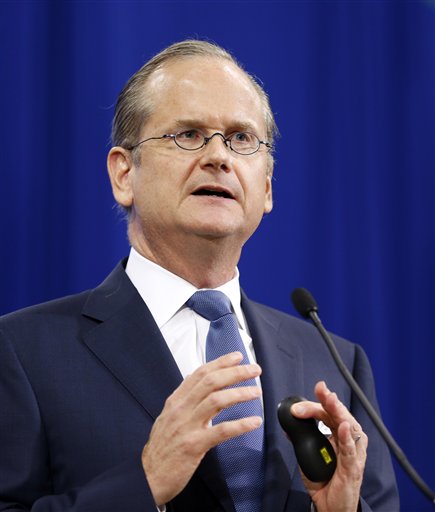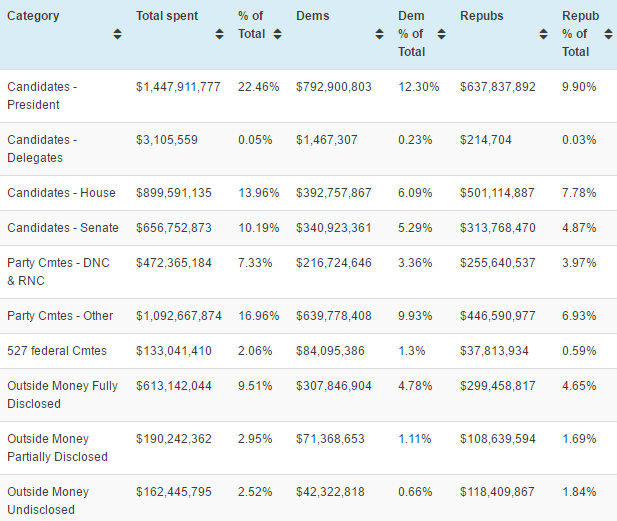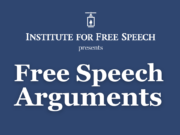Lawrence Lessig doesn’t want to talk about campaign finance reform anymore, probably because those conversations haven’t been going very well for him lately. Instead, speaking at the American Enterprise Institute on Friday, Lessig retreated to a line of criticism more amenable to Americans’ taste: doesn’t Congress just suck?
On that point, it’s hard to disagree, but Lessig’s diagnosis and remedy for the cause of the problem continue to miss the mark. He puts a laser-like focus on the arcana of campaign finance regulation and redistricting to the neglect of other, more significant levers of power in government, despite the fact that his own presidential campaign succeeded at raising money, but was nonetheless forced to close shop because the Democratic Party boxed him out of the debates (at least in his point of view). One is left to ask: is money really the problem?
A similar myopia was on display throughout Lessig’s candidacy as he touted the legacy of Eugene McCarthy’s upstart 1968 bid for the Democratic nomination as a model for his own. But, as others have noted, the success of McCarthy’s anti-Vietnam War campaign was not due to some tax-financed campaign scheme, but rather to a handful of wealthy opponents of the war who were able to give unlimited financial support to spread McCarthy’s message in an era largely devoid of onerous campaign finance regulations. Thanks to a web of fundraising restrictions that Lessig supports, candidates today can’t raise money anywhere near as quickly, forcing them to run much longer campaigns.
To his credit, Lessig expressed doubt that campaign spending (and political spending generally) had any significant effects on voters – he would know – and criticized politicians who propose ineffective or unrealistic reforms to campaign finance law, such as constitutional amendments to reverse Citizens United, which he called “cheap talk.” And when Larry Lessig says your proposals to get money out of politics are unrealistic, oh boy.
Instead, Lessig is concerned with how fundraising affects candidates. But here he throws the baby out with the bath water, forgetting that the freedom to raise and spend money on politics is essential for voters to communicate with each other and hold their elected officials accountable. Here’s an example of what I mean: when asked by an audience member about other reforms to make elections more competitive, Lessig expressed support for the idea – but only after there was a “solution” to money in politics. Otherwise, Lessig warned, jumping from 90 competitive House seats to 435 competitive House seats would massively increase the amount of money spent on campaigns, increasing the influence of wealthy donors even further (in Lessig’s view).
Think about that. If competitive races shift power to the wealthy, doesn’t that mean that incumbent politicians who run unopposed are the best representatives of their constituents? Let’s just junk elections altogether, and then those nasty rich folks won’t have any campaigns to contribute to! Problem solved!
This is where Lessig’s slick PowerPoints fall short. The freedom that allows people to donate to candidates and Super PACs is the same freedom that allows Lessig to promote his wacky campaign “reform” ideas, the same freedom that allowed Eugene McCarthy’s supporters to give the anti-war movement a voice in the 1968 presidential campaign, and the same freedom that allows The New York Times and The Washington Post to report on it all.
The primary reason citizens contribute to candidates and causes is to support a message they believe in. If Lessig agrees that campaign spending has a minor (at best) influence on voters, why does he think candidates are so willing to betray their constituents for a contribution?
After raising millions of dollars and failing with Mayday PAC, and raising millions of dollars and failing with a presidential campaign, Lessig and his fans might be well served to ask whether they have bigger problems than money in politics.














